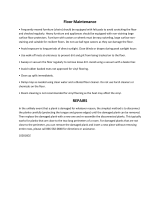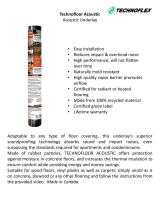
18-30°C
<45°C
Basic
SunHeat
>45°C
1
32a 2b
4
CLICK - CLICK PLUS
1. PREPARATION
1
Always store and transport Quick-Step Livyn floors carefully to prevent distortions. Store and transport the boxes on a flat surface in neat stacks. Never store the boxes upright or
in moist, dusty rooms or places with extreme temperatures. Quick-Step Livyn floors must be acclimatized in the room of installation between 18-30°C (64-86°F) for a period of
at least 48 hours before installation. This floor- & roomtemperature needs to be maintained prior to, during and for at least 24 hours after the installation is completed. Installation
must be performed between 18-30°C.
2
Quick-Step Livyn has been designed for indoor heated (> 0°C) (32°F) installations, preferably at normal room temperature. Quick-Step Livyn cannot be installed in solariums,
seasonal porches, camping trailers, boats or any other unheated application. If the temperature of your floor is expected to raise up to or above 45°C (113°F) due to direct
sunlight, it is mandatory to use the SunHeat underlay on a levelled mineral subfloor or to install without underlay on a levelled mineral subfloor A heavy wood stove, electrical
accumulators, and others should not be installed on top of the Quick-Step Livyn click floor. It is recommended to install the stove/accumulator first on top of a protection plate, and
install the Quick-Step Livyn around the plate and respect the dilatation gaps. For other critical situations with high local temperatures it is recommended to use Quick-Step Livyn
glue down. If you have any concerns about the temperature of your floor, please contact the Quick-Step technical department.
3
The type of subfloor, its quality and its preparation has a big influence on the final installation result. If the subfloor is not appropriate for the installation of Quick-Step Livyn then
necessary actions should be taken. Contact your Quick-Step Livyn dealer, who will be more than happy to help you. Be aware that unevenness in the subfloor may leave marks
and can create gaps in your Quick-Step Livyn floor. The subfloor should be stable and firmly fixed. Furthermore it cannot be soft, damaged or loose laid.
The following floor coverings have to be removed: Carpet, needle felt, cushion vinyl, floating floorcoverings.
Does not have to be removed: ceramic tiles, glue down laminate and glue down lacquered parquet, fixed wood boards, etc.
Does not have to be removed, but use of PE-foil is mandatory to avoid migration: glued PVC, hard PVC, VCT, glued linoleum and glue down oiled parquet.
4
A transition profile is needed when the temperatures in adjacent rooms will variate differently above and below the T-range of 18 - 30°C. A subfloor control joint can be covered
with Quick-Step Livyn click flooring. Building movement joints must be transposed to the Quick-Step Livyn flooring and a profile must be used.
5
In case of installation on a wooden subfloor, please remove any existing floor covering first. No signs of mold and/or insect infestations should be present. Make sure the subfloor
is level and nail or screw down any loose parts. Apply a suitable wooden floor panel, level floor, or use levelling compound on top for a perfect subfloor preparation. The levelling
boards must be fixed with an appropriate glue or every 30cm with screws. An eventual crawl space under the plank floor must be sufficiently ventilated. Remove any obstacles
and make sure there is sufficient ventilation (minimum 4 cm² total ventilation openings per m² of floor). The moisture content of the wood must not exceed 10%.
6
Make sure the subfloor is completely flat. Cement joints between tiles or other gaps of more than 1 mm (0,04inch) in depth and 4 mm (0,16inch) in width should be levelled . For
Quick-Step Livyn Click flooring: any unevenness of more than 0,5mm (0,02inch) over a length of 20cm (7,87inch) must be levelled out. The same applies to unevenness of more
than 3mm (0,12inch) over a length of 2m (78,7inch). Bumps should be removed by sanding or scraping. An appropriate levelling compound is required and check if a primer or
sealer is needed. In some cases, the use of an underlay can avoid extra levelling of the subfloor.
1. PREPARATION 2. INSTALLATION 3. FINISHING 4. MAINTENANCE
IN ORDER TO OBTAIN A GOOD RESULT, WE ADVISE TO FOLLOW ALL GIVEN INSTRUCTIONS
CAREFULLY.












